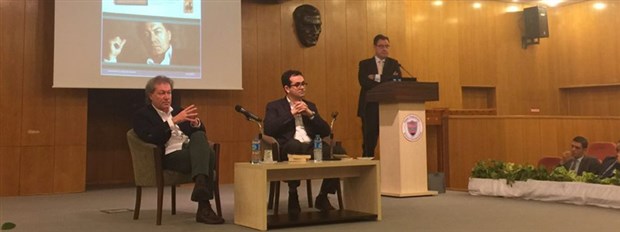 On Tuesday, March 1, the Department of Turkish Literature hosted an interview with Ercüment Cengiz, acclaimed author of the historical novels “Gırnatacı” (The Clarinetist, 2012) and “Çellocu” (The Cellist, 2014). The interview, on the topic “Where Does Music Stand in the Novel? The Novel and Music on a Historical Basis,” took place in C Block Auditorium and was well attended by Bilkent’s literary enthusiasts.
On Tuesday, March 1, the Department of Turkish Literature hosted an interview with Ercüment Cengiz, acclaimed author of the historical novels “Gırnatacı” (The Clarinetist, 2012) and “Çellocu” (The Cellist, 2014). The interview, on the topic “Where Does Music Stand in the Novel? The Novel and Music on a Historical Basis,” took place in C Block Auditorium and was well attended by Bilkent’s literary enthusiasts.
The session was moderated by Cem Erciyes, well-known critic and editor-in-chief of the Radikal newspaper. Responding to questions posed by Mr. Erciyes and the audience, Dr. Cengiz talked about the relationship between the novel, music and history, sharing some of the secrets of his writing and his views on what a novel should be.
His remarks moved from a humorous anecdote involving Ottoman bureaucrat Halil Şerif Pasha, artist Gustave Courbet and Courbet’s notorious work “L’Origine du Monde,” to such topics as why Dr. Cengiz wanted “Gırnatacı” to be a story about brotherhood, and how he believes that the novel genre has many similarities to music, since the composition of both requires the application of a certain rhythm. Dr. Cengiz, who is a physician as well as a novelist, also spoke about why he started writing fiction, and voiced his belief that a world where more people read novels would be a more peaceful one. A reception was held after the interview, where the writer signed his books and conversed with the guests.
Ercüment Cengiz, born in Kastamonu in 1958, graduated from Hacettepe University Medical School in 1983 and went on to specialize as a gynecologist. His first novel, “Gırnatacı,” was published in 2012 and received the Everest First Novel Award in the same year. “Gırnatacı” tells the story of an Ottoman clarinetist who ends up in America playing jazz, leaving behind both his lover Meline and his best friend Kevork, whose memory will come back to haunt him. The author’s second novel, “Çellocu,” which concerns a love triangle taking place in İstanbul in the era of Sultan Abdülmecid, came out in 2014.
By Nihan Simge Soyöz (EDEB/Graduate Student)
